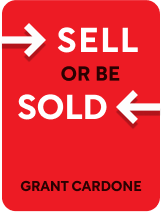

This article is an excerpt from the Shortform book guide to "Sell or Be Sold" by Grant Cardone. Shortform has the world's best summaries and analyses of books you should be reading.
Like this article? Sign up for a free trial here .
Why is a positive sales attitude important? How do you improve your selling attitude?
A positive sales attitude is very important because attitudes are contagious, and buyers prioritize interacting with positive people because they need to feel good. You can improve your sales attitude by avoiding negative media content, thoughts, and people. You should also be aware of how negative you are yourself, and take steps to replace that negativity with positive thoughts and actions.
Read more to discover how to improve your sales attitude.
Adopting a Positive Sales Attitude
The third step to mastering sales is adopting a positive sales attitude. Sales environments are often negative because it’s easy for negative people to get a job in sales—there’s no screening out of negative people, and many companies have low training standards.
However, your environment needs to be positive, both physically and mentally, for you to sell successfully. This is because attitudes are contagious and people are motivated by the need to feel good. Especially today, with a lot of bad news in the papers and online, customers prioritize interaction with someone positive who can solve problems over product features or price.
- For example, when Cardone was selling trucks, an aggressive customer approached him and demanded a ridiculously low price. Cardone responded with a positive attitude—he smiled and thanked the man for coming in. He then spent an hour showing the man a truck. When the man was ready to buy, Cardone added $2,000 to the requested price to cover Cardone taking care of the man for four years. The man said he could get the truck elsewhere to avoid that fee, and Cardone agreed but pointed out that he couldn’t get Cardone somewhere else. The man bought the truck at Cardone’s price because he thought Cardone was valuable.
If you’re not getting what you want or making as much as you want, your sales attitude is at least partly responsible. To improve your sales attitude:
- Avoid media such as radio, TV, and newspapers.
- Avoid people who believe in limitations, aren’t successful, and have problems. You can try to help them, but don’t spend much time with them.
- Assess your coworkers. Anyone who’s negative about their coworkers, company, or products should be your enemy.
- Don’t let anyone talk negatively in your presence. Put up signs to remind people.
- Ask management to ban negative talk about clients.
- Don’t drink or do drugs (even prescription ones) because they dull your awareness and make you slow.
- Become aware of how negative you are yourself—you can’t change anything until you notice it. When you have a negative thought or action, write it down.
- Practice eliminating negative thoughts. Actions stem from thoughts, so if you can control your thoughts, you’ll be able to control the actions that shape your life. Try the following exercise: For 24 hours, don’t let any negative thoughts enter your mind and don’t do any negative actions (such as badmouthing). If you don’t last 24 hours, write down the negative thought or action that derailed you and restart the exercise. (It’s going to be hard—Cardone knows a lot of people who don’t make it 10 minutes before having to restart.)
- Tell everyone in your life what your goals are and how they can help you achieve them.

———End of Preview———
Like what you just read? Read the rest of the world's best book summary and analysis of Grant Cardone's "Sell or Be Sold" at Shortform .
Here's what you'll find in our full Sell or Be Sold summary :
- How your happiness and even survival depend on your selling ability
- The five steps to becoming a master salesperson
- Step-by-plans to lead the customer to make a purchase






